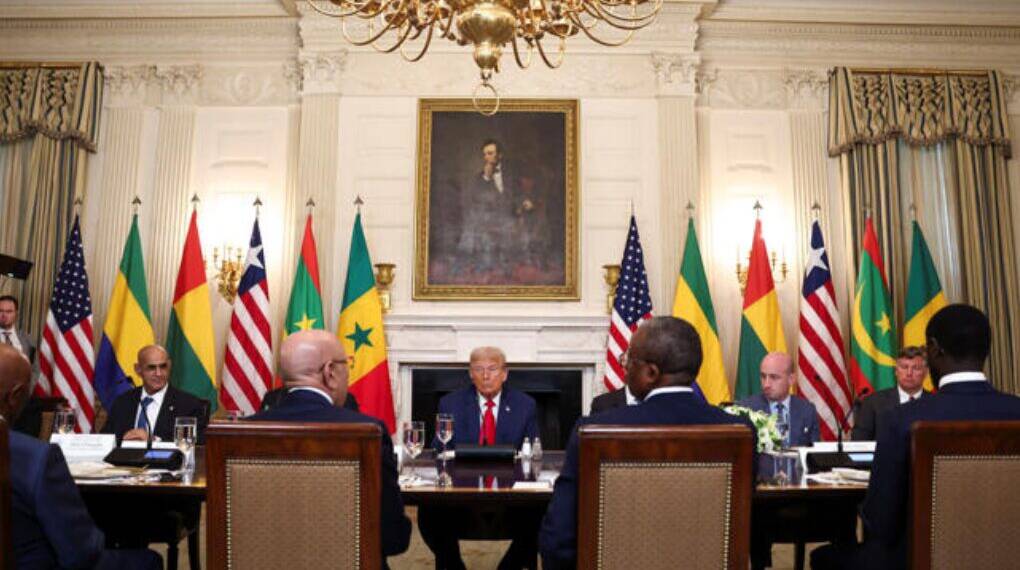President Donald Trump hosted a high-profile working lunch at the White House on Wednesday with the leaders of five West African nations: Gabon, Guinea-Bissau, Liberia, Mauritania, and Senegal. The multilateral meeting, aimed at strengthening U.S.-Africa relations, spotlighted trade, investment, security, and the vast natural resource potential of the continent.
A Shift from Aid to Partnership
Senior White House officials emphasized that the Trump administration is pivoting away from traditional aid-based models and focusing instead on building partnerships rooted in mutual economic benefit. “We’re prioritizing trade and investment over charity,” a senior advisor said. “These are not poor countries—they’re resource-rich partners waiting for the right opportunities.”
President Trump echoed this sentiment during the lunch, calling the attending nations “very vibrant places with very valuable land, great minerals, great oil deposits, and wonderful people.”
Raw Materials, Real Opportunities
The leaders of the visiting nations shared a common message: Africa’s wealth lies beneath its soil. Gabon’s President Brice Oligui Nguema noted his country’s openness to foreign investment, especially in energy infrastructure. “We are rich in raw materials but need partners for win-win development,” he said.
Mauritania’s President Mohamed Ould Ghazouani reinforced the sentiment, stating, “We have a great deal of resources and a lot of opportunities to offer.”
Senegalese President Bassirou Diomaye Faye invited Trump to visit his country’s upcoming golf tourism project, emphasizing its proximity to the U.S., just a six-hour flight from New York. “You could show off your golf skills,” he joked.
DFC Investment in Gabon
The U.S. International Development Finance Corporation (DFC) announced new development funding for the Banio Potash Mine in Mayumba, Gabon, which could reduce the country’s dependency on imported materials. “This is about opening new markets, strengthening relationships, and promoting a secure and prosperous global economy,” said Conor Coleman, DFC’s head of investments.
China’s Shadow Looms Large
Though not officially addressed, the meeting comes amid growing concern over China’s dominant presence in Africa’s resource sector. With China heavily investing in extraction and infrastructure, the U.S. is seeking to counterbalance with a model focused on local development, democratic governance, and long-term partnerships.
Trump on Peace and Trade as Leverage
Trump also referenced his role in mediating a recent peace agreement between the Democratic Republic of the Congo and Rwanda. “There’s a lot of anger on your continent. We’ve been able to solve a lot of it,” he said. He added that trade itself has become a diplomatic tool: “You guys are going to fight, we’re not going to trade. And we seem to be quite successful in doing that.”
A Moment of Awkwardness
The meeting wasn’t without its viral moment. A clip circulating online shows Trump interrupting a West African leader mid-speech. “Maybe we’re going to have to go a bit quicker than this… If I could just ask your name and your country, that would be great,” Trump said with a smirk. The exchange drew criticism on social media, with some calling it dismissive.
Tariff-Free Promise and Upcoming Summit
Trump assured the leaders that their nations are unlikely to face new U.S. tariffs. He also hinted at a broader African Leaders Summit planned for September, coinciding with the UN General Assembly in New York.
Migration, Security, and Drug Trafficking
While trade was front and center, the Trump administration is also closely watching security issues. Mauritania, Senegal, and Guinea-Bissau serve as key routes in African migration and are battling drug trafficking issues closely monitored by U.S. security agencies.
Mixed Reactions from African Officials
While leaders welcomed Trump’s business-forward approach, African Union officials expressed skepticism. They questioned how meaningful trade could expand amid restrictive U.S. visa policies and what they called “abusive” tariff proposals targeting African exports.
From Aid to Accountability
Earlier this month, U.S. authorities confirmed the winding down of USAID’s traditional development programs. The shift is expected to have major consequences: The Lancet recently reported that such cuts could result in over 14 million additional deaths by 2030 due to reduced healthcare access across developing nations.
Wednesday’s meeting may have involved only five nations, but the implications could be global. Trump’s effort to court Africa’s mineral-rich economies reflects a broader geopolitical shift: one where economic diplomacy, rather than military aid or humanitarian assistance, is the new battleground for influence on the continent.
With a possible African summit in September, the Trump team is signaling a renewed, business-first American presence in Africa—one built on trade, extraction, and strategic partnerships.








